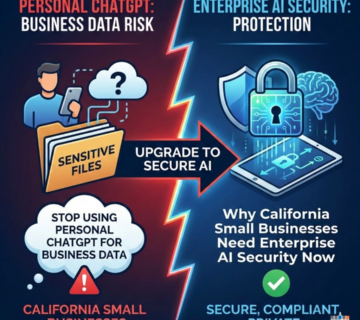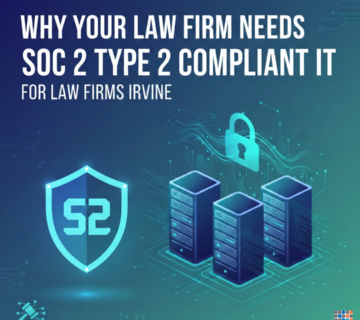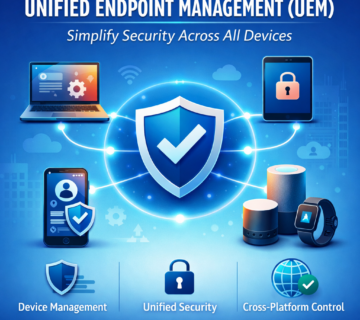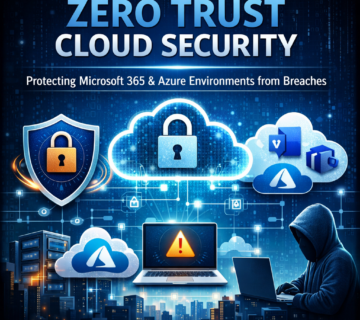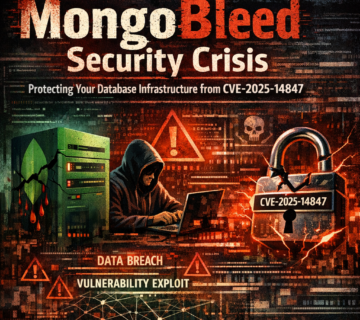Critical Security Alert: SimpleHelp RMM Vulnerability Exposes Organizations to Ransomware Attacks
🎙️ Dive Deeper with Our Podcast!
Critical Security Alert: SimpleHelp RMM Vulnerability Exposes Organizations to Ransomware Attacks
👉 Listen to the Episode: https://technijian.com/podcast/simplehelp-rmm-ransomware-vulnerability-and-mitigation/
Subscribe: Youtube | Spotify | Amazon
Executive Summary
A critical security vulnerability in SimpleHelp Remote Monitoring and Management (RMM) platform has resulted in successful ransomware attacks against multiple organizations, including a major utility billing software provider. The exploit, targeting CVE-2024-57727, demonstrates how unpatched IT management tools can become gateways for sophisticated cyber attacks.
Understanding the SimpleHelp RMM Security Breach
What Happened?
Cybersecurity authorities have confirmed that threat actors have been actively exploiting a path traversal vulnerability in SimpleHelp RMM since January 2025. The attack campaign specifically targeted SimpleHelp versions 5.5.7 and earlier, affecting organizations that rely on this popular remote management solution.
The breach of a utility billing software provider serves as a stark reminder of how supply chain attacks can cascade through interconnected business networks, ultimately impacting downstream customers and critical infrastructure services.
The CVE-2024-57727 Vulnerability Explained
The vulnerability at the center of these attacks is classified as a path traversal flaw, which allows unauthorized access to files and directories beyond the intended web application boundaries. This security weakness enables attackers to:
- Access sensitive configuration files
- Retrieve authentication credentials
- Gain unauthorized system access
- Move laterally through connected networks
- Deploy ransomware payloads
CISA Response and Advisory Details
Known Exploited Vulnerabilities Catalog Addition
The Cybersecurity and Infrastructure Security Agency (CISA) moved swiftly to address this threat by adding CVE-2024-57727 to its Known Exploited Vulnerabilities (KEV) Catalog on February 13, 2025. This designation signals the active exploitation of the vulnerability in real-world attacks.
Federal Guidance and Recommendations
CISA’s advisory emphasizes the urgency of addressing this vulnerability, particularly for organizations in critical infrastructure sectors. The agency’s recommendations reflect the serious nature of the threat and the potential for widespread impact across multiple industries.
Technical Analysis and Attack Methodology
How Attackers Exploit SimpleHelp RMM
The attack methodology follows a predictable pattern that highlights the importance of comprehensive security monitoring:
- Initial Access: Attackers scan for vulnerable SimpleHelp RMM instances exposed to the internet
- Exploitation: The path traversal vulnerability provides unauthorized file system access
- Credential Harvesting: Attackers extract authentication information from configuration files
- Lateral Movement: Compromised credentials enable access to connected client systems
- Ransomware Deployment: Double extortion tactics combine data theft with encryption
Double Extortion Ransomware Tactics
Modern ransomware groups have evolved beyond simple file encryption, implementing double extortion strategies that create multiple pressure points for victims. This approach involves stealing sensitive data before encryption, then threatening public disclosure if ransom demands are not met.
Immediate Response and Mitigation Strategies
System Identification and Assessment
Organizations must take immediate action to identify vulnerable systems within their infrastructure:
Version Verification Process:
- Locate the SimpleHelp server configuration file at
/SimpleHelp/configuration/serverconfig.xml - Check the version number at the top of the file
- Any version 5.5.7 or earlier requires immediate attention
Endpoint Assessment:
- Windows systems: Check
%APPDATA%\JWrapper-Remote Access - Linux systems: Examine
/opt/JWrapper-Remote Access - macOS systems: Review
/Library/Application Support/JWrapper-Remote Access
Critical Remediation Steps
Immediate Actions:
- Isolate vulnerable servers from internet connectivity
- Stop SimpleHelp service processes on affected systems
- Upgrade to the latest SimpleHelp version following vendor guidelines
- Implement network segmentation to limit potential lateral movement
Advanced Security Measures:
- Deploy continuous network monitoring solutions
- Conduct comprehensive threat hunting activities
- Scan for suspicious executable files with three-letter names (e.g., aaa.exe, bbb.exe)
- Verify system integrity using reputable security scanning tools
Long-term Security Improvements
Asset Management and Inventory Control
Effective cybersecurity requires comprehensive visibility into organizational IT assets. Regular asset inventories help ensure that all systems receive timely security updates and appropriate monitoring coverage.
Backup and Recovery Preparedness
Robust backup strategies remain the most effective defense against ransomware attacks. Organizations should maintain:
- Regular offline backups stored separately from production systems
- Tested recovery procedures with documented restoration timeframes
- Multiple backup copies across different storage media and locations
Third-Party Risk Management
The SimpleHelp incident underscores the importance of vendor security assessment and ongoing monitoring. Organizations should evaluate the security practices of all technology providers, particularly those with privileged access to internal systems.
Industry Impact and Broader Implications
Supply Chain Security Concerns
The breach of a utility billing software provider demonstrates how attacks against managed service providers can impact multiple downstream organizations. This cascading effect amplifies the importance of supply chain security assessments and vendor risk management programs.
Critical Infrastructure Vulnerability
Attacks targeting utility companies and other critical infrastructure providers pose significant risks to public safety and economic stability. The interconnected nature of modern infrastructure means that single points of failure can have far-reaching consequences.
Regulatory and Compliance Considerations
Reporting Requirements
Organizations experiencing ransomware incidents must navigate complex reporting requirements across multiple jurisdictions. CISA and FBI guidance emphasizes the importance of prompt incident reporting to support broader threat intelligence efforts.
Legal and Financial Implications
Ransomware attacks can trigger significant legal and financial consequences, including regulatory fines, litigation costs, and business disruption expenses. Proactive security measures often prove more cost-effective than reactive incident response efforts.
Prevention and Best Practices
Patch Management Excellence
Effective patch management requires systematic approaches that balance security needs with operational requirements:
- Maintain comprehensive software inventories
- Implement automated vulnerability scanning
- Establish clear patch deployment timelines
- Test patches in controlled environments before production deployment
Network Security Architecture
Modern network security architectures should incorporate multiple defensive layers:
- Network segmentation to limit lateral movement
- Zero-trust access controls for remote management tools
- Continuous monitoring for anomalous network activity
- Regular security assessments and penetration testing
Employee Training and Awareness
Human factors remain critical components of effective cybersecurity programs. Regular training should cover:
- Recognition of social engineering tactics
- Proper handling of suspicious communications
- Incident reporting procedures
- Remote work security best practices
Frequently Asked Questions (FAQ)
Q: How can I determine if my organization uses SimpleHelp RMM?
A: Check your IT asset inventory for SimpleHelp installations, or contact your IT department to verify whether SimpleHelp is deployed in your environment. Look for the SimpleHelp service running on Windows systems or examine network connections for SimpleHelp traffic patterns.
Q: What should I do if I discover a vulnerable SimpleHelp installation?
A: Immediately isolate the affected system from network connectivity, stop the SimpleHelp service, and coordinate with your IT security team to implement the latest software updates. Document the discovery and assess potential exposure to ensure comprehensive remediation.
Q: Are there alternative RMM solutions that might be more secure?
A: Multiple RMM solutions are available in the market, each with different security features and update practices. Evaluate alternatives based on your specific requirements, including security track record, patch management processes, and compliance certifications.
Q: How can organizations prevent similar supply chain attacks?
A: Implement comprehensive vendor risk management programs that include security assessments, regular security reviews, and clear contractual requirements for security practices. Maintain visibility into third-party access and monitor for suspicious activities across all vendor connections.
Q: What are the signs that my organization might have been compromised through this vulnerability?
A: Monitor for unusual network traffic patterns, unexpected file modifications, new user accounts or privilege escalations, and suspicious executables with three-letter filenames created after January 2025. Implement comprehensive logging and monitoring to detect potential indicators of compromise.
Q: Should organizations pay ransomware demands to recover their data?
A: CISA and FBI strongly advise against paying ransomware demands, as payment does not guarantee data recovery and may encourage additional attacks. Focus on prevention, backup strategies, and incident response capabilities rather than ransom payment considerations.
Q: How long should organizations maintain incident response documentation?
A: Maintain incident response documentation for at least seven years to support potential legal proceedings, insurance claims, and regulatory compliance requirements. Ensure documentation includes technical details, timeline information, and lessons learned for future reference.
Q: What role does cyber insurance play in ransomware incident response?
A: Cyber insurance can provide valuable financial protection and access to specialized incident response resources. However, insurance should complement, not replace, proactive security measures and comprehensive incident response planning.
How Our Cybersecurity Technicians Can Help
Comprehensive Security Assessment Services
Our experienced cybersecurity professionals provide thorough security assessments that identify vulnerabilities like CVE-2024-57727 before they can be exploited. We conduct detailed evaluations of your IT infrastructure, including remote management tools, to ensure comprehensive security coverage.
Rapid Incident Response Support
When security incidents occur, time is critical. Our certified incident response team provides 24/7 emergency support to help organizations contain threats, preserve evidence, and restore normal operations. We work directly with law enforcement and regulatory agencies to ensure proper incident handling procedures.
Ongoing Security Monitoring and Management
Proactive security monitoring helps detect and respond to threats before they cause significant damage. Our managed security services include continuous network monitoring, threat hunting, and vulnerability management to keep your organization protected against evolving cyber threats.
Custom Security Training and Awareness Programs
Employee education remains one of the most effective defenses against cyber attacks. We develop customized training programs that address your organization’s specific risk factors and help build a security-conscious culture throughout your workforce.
Contact Information:
- 24/7 Emergency Response Hotline: Phone: (949) 379-8500
- Security Assessment Consultation: Email: sales@technijian.com
- Managed Services Information: Website: Technijian.com
Stay informed about the latest cybersecurity threats and protective measures by following our security advisories and subscribing to our threat intelligence updates.
About Technijian
Technijian is a premier managed IT services provider, committed to delivering innovative technology solutions that empower businesses across Southern California. Headquartered in Irvine, we offer robust IT support and comprehensive managed IT services tailored to meet the unique needs of organizations of all sizes. Our expertise spans key cities like Aliso Viejo, Anaheim, Brea, Buena Park, Costa Mesa, Cypress, Dana Point, Fountain Valley, Fullerton, Garden Grove, and many more. Our focus is on creating secure, scalable, and streamlined IT environments that drive operational success.
As a trusted IT partner, we prioritize aligning technology with business objectives through personalized IT consulting services. Our extensive expertise covers IT infrastructure management, IT outsourcing, and proactive cybersecurity solutions. From managed IT services in Anaheim to dynamic IT support in Laguna Beach, Mission Viejo, and San Clemente, we work tirelessly to ensure our clients can focus on business growth while we manage their technology needs efficiently.
At Technijian, we provide a suite of flexible IT solutions designed to enhance performance, protect sensitive data, and strengthen cybersecurity. Our services include cloud computing, network management, IT systems management, and disaster recovery planning. We extend our dedicated support across Orange, Rancho Santa Margarita, Santa Ana, and Westminster, ensuring businesses stay adaptable and future-ready in a rapidly evolving digital landscape.
Our proactive approach to IT management also includes help desk support, cybersecurity services, and customized IT consulting for a wide range of industries. We proudly serve businesses in Laguna Hills, Newport Beach, Tustin, Huntington Beach, and Yorba Linda. Our expertise in IT infrastructure services, cloud solutions, and system management makes us the go-to technology partner for businesses seeking reliability and growth.
Partnering with Technijian means gaining a strategic ally dedicated to optimizing your IT infrastructure. Experience the Technijian Advantage with our innovative IT support services, expert IT consulting, and reliable managed IT services in Irvine. We proudly serve clients across Irvine, Orange County, and the wider Southern California region, helping businesses stay secure, efficient, and competitive in today’s digital-first world.
